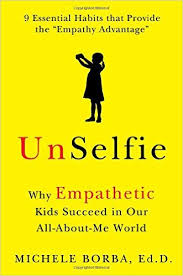Empathy may seem like a “soft” skill, one that’s not very important to acquire, or teach our children in order to be successful in school or life. But, new research on the topic shows that empathy is far from “soft”, and actually plays an integral role in predicting kids’ current and future happiness, success and overall well-being, according to Dr. Borba’s book Unselfie: Why Empathetic Kids Succeed in Our All-About-Me World. Research shows that having the ability to empathize affects our health, wealth, authentic happiness, relationship satisfaction, and ability to bounce back from adversity faster. In fact, Harvard Business Review named it one of the “essential ingredients for leadership success and excellent performance”. And, just like all character traits, it is a skill that can be taught, learned, cultivated and lived.

When I was teaching, I learned the importance of being able to take the perspective of another person (one of the four components of empathy, according to Sociologist Brene Brown) because no matter how amazing I thought my lessons were, if I couldn’t put myself in my students’ shoes to try to understand the lesson from a five-year-old’s point-of-view, then I was not going to be an effective educator. I found this skill imperative when I started teaching mindfulness to kids, too. If I just assumed children were going to sit down, chill and engage in a “boring” mindfulness exercise, I was kidding myself. Children thought it was silly and teenagers thought it was weird. So, I had to “put myself in their shoes”, and find a way to make it appealing to each unique age-group, and kid. I told younger children that they were growing their super power skills to be able to control their mind, and teenagers that some of the best rockstar athletes, like Lebron James, Kobe Bryant and Steph Curry, practice mindfulness regularly to gain self-control and concentration. I found that only when I was able to relate to the perspective of my students could I build connection, and truly educate. (Below is a powerful video demonstrating that students know what they need to learn, and that we just need to listen.)
However, (and I’m sure you won’t find this shocking) empathetic thinking is not innate to human beings. It is not natural for us to think about the world from another person’s perspective. In fact, the opposite is true. Generally, when someone does something to offend us, like taking a parking spot we were waiting for, or cutting in front of us in line, we take it personally, thinking, “How dare she take MY spot or cut in front of ME.” We also attribute it to an intrinsic character of that person that may sound something like, “What a jerk” or “That person must have no morals at all to cut in front of me like that.” But, when we do something to inconvenience others, we attribute it extrinsic forces. For example, “Sorry I’m late, I hit so many red lights on my way here.” We all do this so often that behavioral scientist created a name for it, called fundamental attribution error (FAE), according to the article How to Raise Kinder, Less Entitled Kids, (according to science). FAE, is our natural way of thinking, but its also self-centered, the opposite of empathy. Empathy allows us to un-center ourselves from the situation, and take the perspective of the other person. So, when someone takes your spot, you might instead think “Eh, he probably didn’t see me.” Or, when someone jumps in front of you at the grocery thinking, “She must be in a hurry; maybe someone’s waiting on her in the car.”

Borba’s book UnSelfie presents research on the current digital craze our children are experiencing in which self-absorption is so common that its creating the most entitled, competitive, self-centered and individualists breed on record. According to her book, self-absorption kills empathy, the foundation of humanity, and it’s why we must get kids to switch their focus from “I, Me, My, Mine ” to “We, Us, Our, Ours.” Her book is full of easy every-day language, strategies and activities to help parents, teachers, counselors and child advocates cultivate empathy in their children in order to give kids the empathy advantage- the edge they need to live meaningful, productive, and happy lives and thrive in a complex world (p. xiv).
Empathy is one of the five modules in the Calma mindfulness curriculum, and I have loved teaching it to kids and teens. I explain that our experiences and thoughts shape the way we see the World. Therefore, we all have a unique perspective that is unlike anyone else’s. In my experience, simply teaching children this concept helps them to respect others’ point-of-view, and even be curious about how it was formed, which is a skill I hope they carry with them forever.
